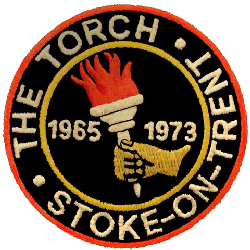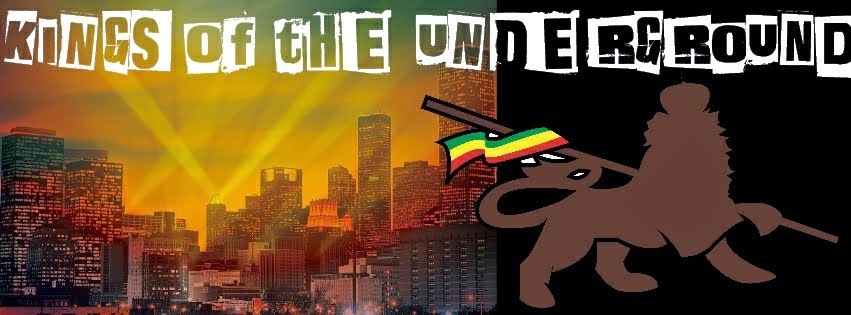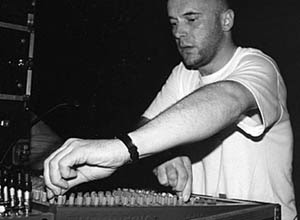Now I know this blog is predominantly a reggae biased blog but I have, as you can see if you look through the archives, also been including some of the more soulful and funky elements from my musical tastes on here as well. These tastes have been born from a love of Northern Soul that I first heard many years ago at a local Thursday night club in town called RSG.
Many people have asked me, usually from the continent, what exactly Northern Soul is, and in truth it is hard to explain. Many people will have listened to some of these songs or indeed own them without really knowing how popular they were or still are among many aficionados of the Northern Soul sound.

The scene is based around obscure and rare soul records that have that have a certain beat or feel and just because one artist has a song played at a Northern Soul night doesn't necessarily mean that all of their songs will be accepted on the scene. A Song that springs to mind is Sammy Davis Jr's 'You Can Count On Me' which is sung over the theme to 'Hawaii 5-O' it's a big favourite, but you won't hear anything else from Mr Davis being played. You can also get someone like Edwin Starr who has many songs played at 'Northern Do's', but I don't think you'll ever hear 'H.A.P.P.Y Radio' as it is deemed too disco. So as I say Northern Soul is about the sound rather than the artist. This fact therefore makes it a very 7", 45rpm vinyl thing; you can of course pick up many 'various' albums and CD's now, but for the purists it's still very much the hunt for the rare and hard to obtain 7" vinyl that's where it’s at. This can of course lead to a bit of elitism among a few, but these can be easily ignored and I've always been a believer in that music is there to be heard.
I could ramble on for ages about the good, the bad and the down right awful that is Northern Soul, but hopefully these following words from an unknown soul will say it better. All I will add though is that when these types of records are played I feel a great sense of joy and abandonment of the stresses of life, just listen to the likes of Eula Cooper on 'Let Our Love Grow Higher' or David & The Giants 'Ten Miles High' and tell me something emotive doesn't move within you for no other music can put a smile on my face and a bounce in my step and certainly make me feel 10 miles high when I hear this type of music.
Northern soul is a music and dance movement that emerged from the British mod scene, initially in northern England in the late 1960s.
Northern soul mainly consists of a particular style of black American soul music based on the heavy beat and fast tempo of the mid-1960s Tamla Motown sound. The Northern soul movement, however, generally eschews Motown or Motown-influenced music that has met with significant mainstream success. The recordings most prized by genre enthusiasts are usually by lesser-known artists, and were initially released only in limited numbers, often by small regional United States labels such as Ric-Tic and Golden World (Detroit), Mirwood (Los Angeles) and Shout and Okeh (New York/Chicago).
Northern soul is also associated with particular dance styles and fashions that grew out of the underground rhythm & soul scene of the late 1960s, at venues such as the Twisted Wheel in Manchester. This scene (and the associated dances and fashions) quickly spread to other UK dancehalls and nightclubs like the Catacombs (Wolverhampton), the Highland Rooms at Blackpool Mecca, Golden Torch (Stoke-on-Trent), and Wigan Casino. As the favoured beat became more up-tempo and frantic, by the early 1970s, northern soul dancing became more athletic, somewhat resembling the later dance styles of disco and break dancing. Featuring spins, flips, and backdrops, club dancing styles were often inspired by the stage performances of visiting American soul acts such as Little Anthony & The Imperials and Jackie Wilson.
During the Northern soul scene's initial years in the late 1960s and early 1970s, popular

Northern Soul records were usually not recent releases, and generally dated from the mid-1960s. This meant that the movement was sustained (and "new" recordings added to playlists) by prominent DJs discovering rare and previously overlooked records. Later on, certain clubs and DJs began to move away from the 1960s Motown sound and began to play new releases with a more contemporary sound.
The phrase northern soul was coined by journalist Dave Godin, and was first publicly used in his weekly column in Blues and Soul magazine in June 1970. In a 2002 interview with Chris Hunt of Mojo magazine, Godin said he had first come up with the term in 1968, to help employees at his record shop, Soul City, in Covent Garden, differentiate the more modern funkier sounds from the smoother, Motown-influenced soul of a few years earlier:
I had started to notice that northern football fans who were in London to follow their team were coming into the store to buy records, but they weren't interested in the latest developments in the black American chart. I devised the name as a shorthand sales term. It was just to say 'if you've got customers from the north, don't waste time playing them records currently in the U.S. black chart, just play them what they like - 'Northern Soul'.
The venue most commonly associated with the early development of the northern soul scene was the Twisted Wheel in Manchester. The club began in the early 1950s as a beatnik coffee bar called The Left Wing, but in early 1963, the run-down premises were leased by two Manchester businessmen (Ivor and Phil Abadi) and turned into a music venue. Initially the Twisted Wheel mainly hosted live music on the weekends and Disc Only nights during the week. Starting in September 1963, the Abadi brothers promoted all-night parties at the venue on Saturday nights, with a mixture of live and recorded music. DJ Roger Eagle, a collector of imported American soul, jazz and rhythm and blues, was booked around this time, and the club's reputation as a place to hear and dance to the latest American R&B music began to grow.
Throughout the mid-1960s, the Twisted Wheel became the focus of Manchester’s emerging mod scene, with a music policy that reflected Eagle’s eclectic tastes in soul and jazz, and featuring live performances by British beat musicians and American R&B stars. Gradually, the music policy became less eclectic and shifted heavily towards fast-paced soul, in response to the demands of the growing crowds of amphetamine-fuelled dancers who flocked to the all-nighters. Dismayed at the change in music policy and the frequent drug raids by the police, Eagle quit the club in early 1967. Eagle said of the regular attendees, "All they wanted was fast-tempo black dance music... [but they were] too blocked on amphetamines to articulate exactly which Jackie Wilson record they wanted me to play."
By then, the reputation of the Twisted Wheel and the type of music being played there had grown nationwide. By 1969, soul fans were travelling from all over the United Kingdom to attend the Saturday all-nighters. The venue’s owners had been able

to fill the vacancy left by Eagle with a growing roster of specialist soul DJs. After attending one of the venue's all-nighters in January 1971, Godin wrote: "...it is without doubt the highest and finest I have seen outside of the USA... never thought I'd live to see the day where people could so relate the rhythmic content of Soul music to bodily movement to such a skilled degree!
The Twisted Wheel gained a reputation as a drug haven, and under pressure from the police and other authorities, the club closed in January 1971. However, by the late 1960s, the popularity of the music and lifestyle associated with the club had spread further across the north and midlands of England, and a number of new venues had begun to host soul all-nighters. These included the King Mojo in Sheffield, The Catacombs in Wolverhampton, Room at the Top in Wigan and Va Va's in Bolton.
Northern soul reached the peak of its popularity in the mid to late 1970s.At this time, there were soul clubs in virtually every major town in the midlands and the north of England. The three venues regarded as the most important in this decade were the Golden Torch in Tunstall, Stoke (1971 to 1972), Blackpool Mecca (1971 to 1979) and Wigan Casino (1973 to 1981).
Although Wigan Casino is probably the best known, the best attended northern soul all-night venue at the beginning of the decade was in fact the Golden Torch, where regular Friday night soul all-nighters began in late 1970. Chris Burton, the owner, stated that in 1972, the club had a membership of 12,500, and 62,000 separate customer visits. Despite its popularity, the club closed down due to licensing problems in March, 1972 and attention switched to soul nights at Blackpool Mecca’s Highland Room, which had started rare soul nights in late 1971.
Wigan Casino began its weekly soul all-nighters in September 1973. Wigan Casino had a much larger capacity than many competing venues and ran its events from 2am until 8am. There was a regular roster of DJs, including the promoter Russ Winstanley. By 1976, the club boasted a membership of 100,000 people, and in 1978, was voted the world's number one discotheque by the American magazine Billboard. This was during the heyday of the Studio 54 nightclub in New York City. By the late 1970s, the club had its own spin-off record label, Casino Classics.
By this time, Wigan Casino was coming under heavy criticism from many soul fans. Contemporary black American soul was changing with the advent of funk, disco and jazz-funk, and the supply of recordings with the fast-paced northern soul sound began to rapidly dwindle. As a result, Wigan Casino DJs resorted to playing any kind of record that matched the correct tempo. Also, the club was subjected to heavy media coverage and began to attract many otherwise uninterested people of whom the soul purists did not approve.
Blackpool Mecca was popular throughout the 1970s, although the venue never hosted all-nighters. The regular Saturday night events began at 8pm and finished at 2am, and initially, some dancers would begin their evenings at Blackpool Mecca and then transfer to Wigan Casino. In 1974, the music policy at Blackpool Mecca sharply diverged from Wigan Casino’s, with the regular DJ including newly released US soul in his playlist. Whilst the tempo was similar to the earlier Motown Records-style recordings, this shift in emphasis heralded a slightly different style of northern soul dancing and dress styles at Blackpool Mecca and created a schism in the northern soul movement between Wigan Casino’s traditionalists and Blackpool Mecca’s more progressive approach, which accepted the more contemporary sounds of Philly soul, early disco and funk.

Other major northern soul venues in the 1970s include The Catacombs in Wolverhampton, Va Va’s in Bolton, the 'Talk of The North' all-nighters at The Pier and Winter Gardens in Cleethorpes, Tiffany’s in Coalville, Samantha’s in Sheffield, 'Heart of England' soul club all-dayers at The Ritz in Manchester and the Nottingham Palais. As the 1970s progressed, the northern soul scene expanded even further nationally. There was a notable scene in the east of England with all-nighters at the St. Ivo Centre in St. Ives, the Phoenix Soul club at the Wirrina Stadium in Peterborough and the Howard Mallett in Cambridge. Other towns with notable northern soul venues at this time included Kettering, Coventry, Bournemouth, Southampton and Bristol. When Wigan Casino closed in 1981, many believed that the northern soul scene was on the verge of disintegrating. However, the 1970s mod revival, the thriving scooterboy subculture and the Acid jazz movement produced a new wave of fans. The popularity of the music was further bolstered in the 1980s by a wave of reissues and compilation albums from small British independent record labels. Many of these labels were set up by DJs and collectors who had been part of the original northern soul scene. The 1980s — often dismissed as a low period for the northern soul scene by those who had left in the 1970s — featured almost 100 new venues in places as diverse as Bradford, London, Peterborough, Leighton Buzzard, Whitchurch, Coventry and Leicester. Pre-eminent among the 1980s venues were Stafford's Top of the World and London's 100 Club.
Part 2
 Jubilee from Zema is an album that is right up my musical street! It has to be said though I'd never heard of this artist before, although this is apparently her sixth album!
Jubilee from Zema is an album that is right up my musical street! It has to be said though I'd never heard of this artist before, although this is apparently her sixth album!













